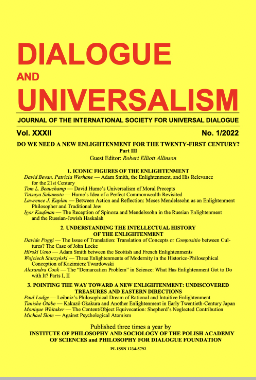SYMBOL AND FAITH IN MIRCEA ELIADE
SYMBOL AND FAITH IN MIRCEA ELIADE
Author(s): Adriana NeacșuSubject(s): Philosophy, History of Philosophy, Social Philosophy
Published by: Instytut Filozofii i Socjologii Polskiej Akademii Nauk i Fundacja Filozofia na Rzecz Dialogu
Keywords: symbol; symbolic thinking; symbolic complex; faith; sacred; profane; archetype; myth; hierophany
Summary/Abstract: This article analyzes Mircea Eliade’s conception of the role of the symbol in the expression of faith. It points out that Eliade considers belief a constitutive structure of the human being, and that homo religious is par excellence a homo symbolicus. Approaching the nature of the symbol as a form of autonomous knowledge, and its structure, it highlights the specificity of symbolic thinking, which generates it. Focusing on the man of archaic societies, exemplary for the religious mentality, it develops the problem of the functions of symbols within traditional communities. It shows that on the basis of archetypal symbolic images, primitive man creates symbolic complexes through which he explains the world and pursues his integration into it—presenting some of the great religious symbolisms. Finally, it highlights Eliade’s position that symbols will never disappear because they are constitutive of the human being, like religious belief, to which they are inextricably linked.
Journal: Dialogue and Universalism
- Issue Year: 2024
- Issue No: 2
- Page Range: 67-91
- Page Count: 25
- Language: English
- Content File-PDF

